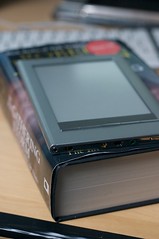I’ve picked up on a few new podcasts recently, all of a pretty techy bent.
All from 5 by 5:
- The EE Podcast keeps it short, since it focuses on goings on around the ExpressionEngine content management system (which I use a lot). I've been pleasantly surprised at how the show keeps being worthwhile and enjoyable to listen to.
- The Dev Show talks around more general software development happenings. I'm finding it good to here about technologies outside of those I use myself. It makes me curious.
- The Conversation is more of a general talk-show type thing, with guests coming and going from the chat with the host. Easy going.
I’ve also recently discovered Huffduffer, which lets you collate audio from around the web and have it sucked into iTunes as a podcast — potentially very handy.
I spend less time in the car, these days, but when I am driving it’s usually with a podcast on the stereo. Lately I’ve been saving the music for while I’m working.
My wife read the quote from Fraser Speirs in yesterday’s post. She said, “That’s exactly how I feel about computers.”
We/she/the world will benefit from a computing appliance that’s more like a washing machine: to get clean clothes, you only very rarely need to know anything about plumbing. For anyone other than the specialist or the hobbyist, an appliance is the means, not the end.
Apple announced some new shiny last week. The tech press made a lot of noise, lots of cheering and lots of booing, and people like me got a little excited. I won’t lie: I’m really looking forward to getting my hands on an iPad. I no longer have my eye on the Kindle DX. (The iPad has been announced at only $10 more in the States. Mental.)
But I’m also looking forward to seeing what happens when some of the people around me lay hands on one. It seems that this thing will meet the computing needs of an awful lot of people out there — normal people, people not like me, people who don’t need the grunt for Photoshop, who don’t always have a terminal window open, people who don’t self-identify as that kind of geek. Web, email, some word-processing and some presentation prep, games, other bits and pieces. If (admittedly that might be a big ‘if’) the UK pricing is in line with what’s been announced for elsewhere, the price is certainly right. It’s a little bit more than a netbook, but it looks to fill the same gaps more effectively. It certainly looks like it’ll do it much more accessibly.
I couldn’t get by with an iPad as my only computer, not by a long way, but I know people who could.
You should go and read a post by Fraser Speirs called Future Shock. Here’s a taster:
...
For years we've all held to the belief that computing had to be made simpler for the 'average person'. I find it difficult to come to any conclusion other than that we have totally failed in this effort.
Secretly, I suspect, we technologists quite liked the idea that Normals would be dependent on us for our technological shamanism. Those incantations that only we can perform to heal their computers, those oracular proclamations that we make over the future and the blessings we bestow on purchasing choices.
Ask yourself this: in what other walk of life do grown adults depend on other people to help them buy something? Women often turn to men to help them purchase a car but that's because of the obnoxious misogyny of car dealers, not because ladies worry that the car they buy won't work on their local roads. (Sorry computer/car analogy. My bad.)
I'm often saddened by the infantilising effect of high technology on adults. From being in control of their world, they're thrust back to a childish, mediaeval world in which gremlins appear to torment them and disappear at will and against which magic, spells, and the local witch doctor are their only refuges.
...
Fraser then posted this tweet the other day:

Another developer, Matt Gemmell, posted these:

Finally, you should read The Failure of Empathy on the Mule Design blog:
...
They [people] want things to work most of the time, and be easy to fix when they don’t. And if the process by which it happens is “magic” they are totally cool with that.
They want the thing in the movies.
As an industry, we need to understand that not wanting root access doesn’t make you stupid. It simply means you do not want root access. Failing to comprehend this is not only a failure of empathy, but a failure of service.
My thoughts exactly.
Last year, I posted a bit about the attraction of ebook readers. About six weeks after that post, my birthday brought me a Sony Reader Touch. I’ve been living with it and using it every day since then.
To recap, the things I want from an ebook reader:
- Good for reading fiction, and good availability of genre fiction in the right format.
- Good PDF performance for reading technical books.
- Solid device functionality.
I am, on the whole, very happy with my Reader. I spend a lot of time with it in my hands, and it does its job well, if imperfectly.
Physically, it’s an attractive, solidly built device. One of the attractions of an ebook reader is that it can make an 800 page book sit comfortably in one hand. For comparison, and a little irony, here’s my Reader sitting on top of a Monstrously Huge Fantasy Book that I bought on the same day:

I find the battery life to be well short of the advertised 7000 page turns, but I comfortably go a week and a half between charges. Charging is over USB, and unfortunately you can’t use it to read while it’s charging.
The display is the Touch’s strength and its weakness. eInk is good, and very comfortable to read. It’s nice and crisp and easy on the eyes, yet the touch sensitive layer on the Reader Touch is quite reflective, which adds some glare and reduces the contrast compared to other readers on the market which use the same display. This means you have to be aware of what angle you hold it at when reading.
That’s a problem, but one which I don’t find to be a big deal, and which for me was well-balanced by the functionality of the device.
To my criteria above, then.
For fiction, an attraction of the Reader Touch was the breadth of formats it can handle, the most important of which is ePub. You can get ePubs all over the web, including from Waterstones. It’s also a nice easy format to work with, and conversion tools from other formats are readily available. Many of the ePubs you can buy are encrypted using Adobe’s Digital Editions DRM system. DRM’s a pain, and largely evil, but ADE is a fairly painless and user-friendly system. The Reader supports it for ePub and for PDF. This means that while I haven’t been able to find everything I’ve wanted to read in an electronic format, much is available.
For technical books, the PDF support is pretty good. At the time it was the best option in the UK, although Amazon have just released the international version of the Kindle DX. I still have my eye on that. The Reader can reflow many PDFs to fit the screen, but you lose diagrams and layout (important for code examples). If you turn it to landscape mode, it can show half a page at a time of most technical PDFs. This is usable and readable, but not stellar. It’s also pretty much the state of the market, unfortunately. There are, however, a few forward-thinking publishers (like the Pragmatic Programmers) who publish ePubs. They’re great. More of that, please.
The Reader handles a wide range of formats, well. The touch interface isn’t necessary, and could maybe be traded for a higher contrast display if it wasn’t at the expense of format support, but it does make sifting through your library very handy. I still like the hardware buttons for page turns, though.
I’ve been looking at ebook readers for a few years, and it’s only now that there are a couple available that I would actually consider buying. At the time I bought the Touch, it was the best option for me that was available in the UK. The technology is still maturing, and the devices are still getting better. The Kindles are compelling, Barnes & Noble’s Nook looks interesting, and there’s a rumour that Apple will be announcing something relevant this evening.
For what it is, though, I’m impressed and content with my Reader, and I manage to use it comfortably every day. That’ll do for now.



